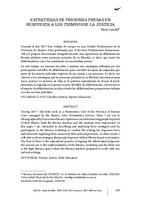| dc.creator | Pérez, Camila | |
| dc.date.accessioned | 2022-09-02T16:51:17Z | |
| dc.date.available | 2022-09-02T16:51:17Z | |
| dc.date.issued | 2020-06-01 | |
| dc.identifier.citation | Pérez, C. (2020). Estrategias de personas presas en respuesta a los tiempos de la justicia. Avá. Revista de Antropología. Posadas: UNaM. FHyCS. PPAS; (36), 269-287. | es_AR |
| dc.identifier.issn | 1851-1694 | |
| dc.identifier.other | RA-311 | |
| dc.identifier.uri | https://hdl.handle.net/20.500.12219/3466 | |
| dc.description | Fil: Pérez, Camila. Universidad Nacional de San Martín. Instituto de Altos Estudios Sociales; Argentina. | es_AR |
| dc.description | Fil: Pérez, Camila. Consejo Nacional de Investigaciones Científicas y Técnicas; Argentina. | es_AR |
| dc.description.abstract | Durante el año 2017 hice trabajo de campo en una Unidad Penitenciaria de la Provincia de Buenos Aires gestionada por el Servicio Penitenciario Bonaerense. Allí me propuse documentar etnográficamente una experiencia de alfabetización llevada adelante entre personas privadas de su libertad, es decir que tanto los alfabetizadores como los estudiantes se encontraban presos.
En este trabajo me interesa describir y analizar tres estrategias utilizadas por los participantes del taller de alfabetización para combatir la espera de respuestas por parte de los actores judiciales respecto de sus causas y sus procesos. Es decir, me referiré a tres estrategias que las personas privadas de su libertad encontraron para hacer justicia. La primera de ellas es la práctica naturalizada de firmar el juicio abreviado, la segunda es la puesta en acto del taller de alfabetización, y la tercera es el espacio de alfabetización jurídica donde los alfabetizadores propusieron trabajar con dos escritos judiciales. | es_AR |
| dc.description.abstract | During 2017 I did field work in a Penitentiary Unit of the Province of Buenos Aires managed by the Buenos Aires Penitentiary Service. There I set out to ethnographically document a literacy experience carried out among people deprived of their liberty: both the literacy teachers and the students were imprisoned.
In this paper I am interested in describing and analyzing three strategies used by participants in the literacy workshop to combat the waiting for responses from judicial actors regarding their causes and their judicial processes. In other words, I will refer to three strategies that people deprived of their liberty found to do justice. The first of these is the naturalized practice of signing the abbreviated judgment, the second one is the implementation of the literacy workshop and the third one is the legal literacy space where the literacy teachers proposed to work with two judicial writings. | en |
| dc.format | application/pdf | |
| dc.format.extent | 291.5 KB | |
| dc.language.iso | spa | es_AR |
| dc.publisher | Universidad Nacional de Misiones. Facultad de Humanidades y Ciencias Sociales. Secretaría de Investigación y Posgrado. Programa de Postgrado en Antropología Social | es_AR |
| dc.relation | info:eu-repo/semantics/altIdentifier/urn/https://www.ava.unam.edu.ar/images/36/n36a12.pdf | |
| dc.relation | info:eu-repo/semantics/altIdentifier/urn/https://www.ava.unam.edu.ar/index.php/ava-36-junio-de-2020 | |
| dc.rights | info:eu-repo/semantics/openAccess | |
| dc.subject | Cárcel | es_AR |
| dc.subject | Justicia | es_AR |
| dc.subject | Espera | es_AR |
| dc.subject | Educación | es_AR |
| dc.subject | Prisons | en |
| dc.subject | Justice | en |
| dc.subject | Wait | en |
| dc.subject | Education | en |
| dc.title | Estrategias de personas presas en respuesta a los tiempos de la justicia | es_AR |
| dc.type | info:eu-repo/semantics/article | |
| dc.type | info:ar-repo/semantics/artículo | |
| dc.type | info:eu-repo/semantics/publishedVersion | |



